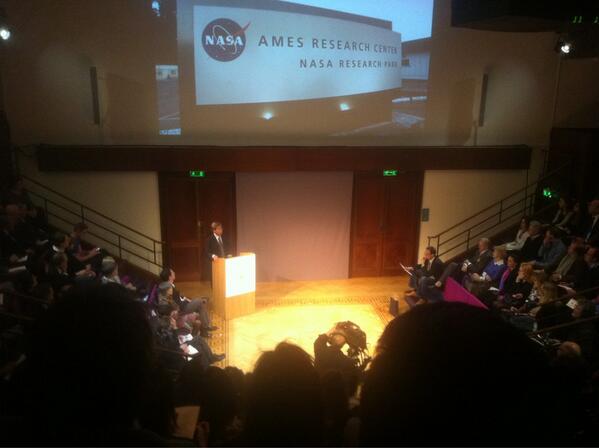Intelligence Squared Debate on the Future of Mobility
I was in London yesterday to watch a debate about the future of mobility (i.e., transport) hosted by Intelligence Squared at the Royal Institution, in the same room Faraday demonstrated electricity. We saw four speakers give their visions for the future. Despite my impression that any of the speakers could have talked for 10 times longer than they did and still be fascinating, the organisers went for TED-style short talks. The format seemed to go quite well because the talks were polished and energy levels were high in the room throughout.
1. Paul Newman
Prof Newman has been developing self-driving cars at Oxford University's Information Engineering department. In a word, his idea of how self-driving cars will take over the world is "gradually". Imagine driving yourself through a traffic jam when your car offers to take over for you in that stretch of road, and, having already participated in a behind-the-scenes auction, has agreed with your insurance company to offer you a 9 pence discount if you do so (given that computers will be safer drivers than people in future).
The motivations for the gradual change seem to be mostly technical. There will be weather conditions and extreme situations in which the car decides for itself that it wouldn't be able to drive very well. The self-driving cars also need a period in which they will learn our driving styles and learn about the world's roads.
2. Robin Chase
Robin Chase co-founded car sharing startup ZipCar and has since gone on to create new ride sharing companies BuzzCar and GoLoco. She painted two possible extremes for car occupancy in the future.
Future hell is the proliferation of zero-occupancy cars, where owners of self-driving cars send their cars on trips round the block while they shop, for lack of available parking options. Or imagine us all cycling to work, but having our cars follow us with our laptops and a change of clothes (in the style of David Cameron)? This scenario was not so plausible to me because I think it currently is, or will be made, illegal to have empty cars driving on the road anywhere in the world.
The future car paradise, in her view, is having 6 people sharing a self-driving car (boosting car occupancy way beyond the current level), but those who can afford it can ride with lower occupancy if they wish. It seems to me that if digital records of car occupancy are kept (which they would be, if we are all ride-sharing in future) then it makes it easy to apply a direct car-occupancy tax, so not many people would be tempted by the much more expensive single-occupancy option.
The other interesting thing she mentioned about the future of car sharing is that car owners would start to fit the car to the occasion (e.g., a swanky car for a first date or a job interview, but something more basic the rest of the time), instead of having to cover all possible scenarios, as they do now, when buying a car that they permanently own.
3. Jerry Sanders
In a polished pitch, Jerry Sanders told us about his plans for SkyTran, a rapid transit system to be built in Tel Aviv. Passengers each get their own pod that will hang from a pylon above the city, but will be propelled magnetically forward ("surfing on a wave of magnetism") at speeds of 100 mph. The speaker painted SkyTran as the solution to congestion.
I like the idea and would definitely take a ride in one if I ever had the chance, but it seems futuristic in the same way that monorails were meant to be the solution to city congestion 30 years ago. What happened to monorails? According to Wikipedia, city councils perceived them to be a high cost and untested solution, so preferred to invest in more mature (but ultimately more expensive) public transport methods like underground rail.
4. Ben Hamilton-Baillie
After hearing three technology-related visions, it was refreshing to hear low-tech but pragmatic ideas from Ben Hamilton-Baillie. He has pioneered "shared spaces" in this country, which boils down to removing all the signs and road markings in an urban area (e.g, Exhibition Road in London) to induce a sense of shared risk and responsibility.
Someone in the audience asked whether that increases the stress levels of pedestrians; "I'm glad you're less comfortable", he replied, because pedestrians are in danger all the time, it's just that they don't feel it.
The talks were followed by a panel Q+A session. Questions from the audience were on topics such as transport of goods (Robin Chase said that there is still massive unspent capacity in freight) the fate of the £40 billion spent by motorists today (someone on the panel said they would prefer we spend it on massages and take-aways) and the love of cars for their own sake (Paul Newman emphasised that technology gives us options, so car lovers can still indulge themselves in future).
